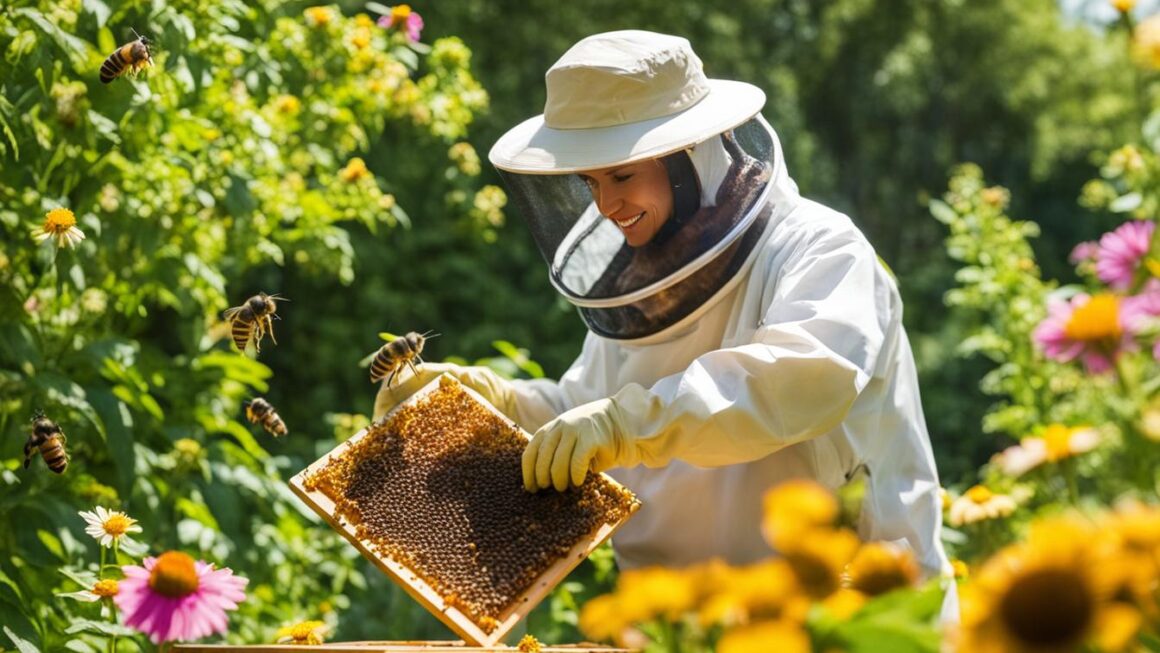When it comes to natural sweeteners, honeycomb is a delicious and nutritious choice. Not only does it add a burst of sweetness to your dishes, but it also offers a range of health benefits that make it a standout ingredient. From improving heart health to supporting your immune system, honeycomb is a powerhouse of nutrients.
Key Takeaways:
- Eating honeycomb can improve heart health and liver function.
- Honeycomb contains raw honey, which is a rich source of antioxidants and enzymes.
- Beeswax in honeycomb provides heart-healthy fatty acids.
- Consuming large amounts of honeycomb may be harmful, and it should not be given to children under 12 months of age.
- Honeycomb can be enjoyed in various ways, such as on bread, in desserts, or alongside fruits and cheeses.
Nutritional Benefits of Eating Honeycomb
Eating honeycomb offers not only a delicious treat but also a range of nutritional benefits. Honeycomb is rich in carbohydrates, antioxidants, and trace amounts of other nutrients. Raw honey, the main component of honeycomb, contains enzymes that have antimicrobial and antibacterial properties. It also tends to have higher levels of antioxidants compared to processed honey. Antioxidants, such as polyphenols, found in honeycomb can help reduce the risk of various health conditions, including diabetes, dementia, heart disease, and certain types of cancer.
Beeswax, another component of honeycomb, provides heart-healthy long-chain fatty acids and alcohols. These compounds may help lower cholesterol levels and improve heart health. Honeycomb is also a natural source of energy due to its high carbohydrate content. Additionally, consuming honeycomb can contribute to a healthy gastrointestinal system and improve gut health.
Nutritional Benefits Summary:
- Rich in carbohydrates, antioxidants, and trace amounts of other nutrients
- Contains enzymes with antimicrobial and antibacterial properties
- Higher levels of antioxidants compared to processed honey
- Polyphenols can help reduce the risk of diabetes, dementia, heart disease, and certain types of cancer
- Beeswax provides heart-healthy long-chain fatty acids and alcohols that may lower cholesterol levels
- Natural source of energy
- Contributes to a healthy gastrointestinal system
Eating honeycomb can be a wholesome and nutritious addition to your diet, providing a range of health benefits. However, it’s important to consume it in moderation as part of a balanced eating plan. If you have any specific health concerns or conditions, it’s always best to consult with a healthcare professional before making any significant changes to your diet.
Honeycomb Benefits for Heart Health
Eating honeycomb can have several advantages for heart health. The unique combination of nutrients found in honeycomb, such as antioxidants and heart-healthy fatty acids, can contribute to a healthier cardiovascular system.
Honeycomb contains beeswax, which is rich in long-chain fatty acids and alcohols. These compounds have been shown to lower “bad” LDL cholesterol levels and increase “good” HDL cholesterol levels. By improving the cholesterol profile, honeycomb can help reduce the risk of heart disease and stroke.
The antioxidants found in honeycomb also play a role in heart health. These compounds help dilate the arteries, improve blood flow, and prevent the formation of blood clots. By promoting healthy circulation, honeycomb may reduce the risk of cardiovascular events.
It’s important to note that while honeycomb can be beneficial for heart health, it should be consumed in moderation. Like any food, excessive intake can lead to weight gain, which can negatively impact cardiovascular health. As with any dietary change, it’s always best to consult with a healthcare professional before making significant changes to your diet.
Honeycomb Benefits for Infections
Honeycomb offers several advantages when it comes to fighting infections caused by bacteria and fungi. The beeswax extracts found in honeycomb have been found to provide protection against disease-causing bacteria, including Staphylococcus aureus, Candida albicans, Salmonella enterica, and E. coli. The antimicrobial properties of honey, which is a main component of honeycomb, can also help protect the gut against certain parasites.
Research has shown that honeycomb’s beeswax extracts have strong antibacterial and antifungal properties, making it potentially effective in combating infections. However, it is important to note that more research is needed to validate these effects in humans. While honeycomb shows promise as a natural remedy for infections, it is always recommended to consult with a healthcare professional for appropriate treatment options.
“The antimicrobial properties of honeycomb, combined with its natural enzymes and antioxidants, make it a potentially valuable resource in the fight against certain bacterial and fungal infections.”
When considering honeycomb as a natural remedy, it is crucial to emphasize that it should not replace medical treatment. It can be used as a complementary approach under professional guidance. Honey or honeycomb should not be given to children under 12 months of age due to the risk of botulism. Overall, honeycomb’s potential benefits for infections showcase the diverse therapeutic properties of this natural product.
Honeycomb Benefits for Infections: A Summary
- Honeycomb’s beeswax extracts offer protection against disease-causing bacteria and fungi.
- The antimicrobial properties of honey, a main component of honeycomb, can help protect the gut against certain parasites.
- More research is needed to validate the effects of honeycomb on infections in humans.
- Honeycomb should not replace medical treatment and should be used as a complementary approach under professional guidance.
By harnessing the power of nature, honeycomb has the potential to play a significant role in supporting the body’s defenses against infections caused by bacteria and fungi. However, it is important to approach honeycomb as a complementary option and not as a replacement for conventional medical treatment. Further investigation into the effectiveness of honeycomb in fighting specific infections will help provide a clearer understanding of its benefits.

Honeycomb Benefits for Coughing in Children: Summary
- – Honeycomb is more effective than cough syrup at reducing coughing in children.
- – The thick consistency of honey helps soothe irritated throat linings.
- – Honeycomb’s natural sweetness can improve the taste of other remedies.
- – Honey or honeycomb should not be given to children under 12 months of age.
Overall, honeycomb can provide a safe and effective option for alleviating coughing in children. However, it is essential to use it responsibly and according to the advice of healthcare professionals.
Honeycomb as a Sugar Alternative for Diabetes
Eating honeycomb can be a beneficial sugar alternative for individuals with diabetes. Honeycomb is naturally sweet, and its unique composition offers advantages for managing blood sugar levels compared to refined sugar. Here are some key reasons why honeycomb can be a good choice for people with diabetes:
- Lower glycemic index: Honeycomb has a lower glycemic index than refined sugar, meaning it causes a slower and more gradual increase in blood sugar levels.
- Reduced insulin resistance: The alcohols found in beeswax, a component of honeycomb, may help reduce insulin resistance, potentially improving the body’s ability to utilize insulin effectively.
However, it’s important to note that honeycomb can still elevate blood sugar levels, so it should be consumed in moderation and as part of an overall balanced diet. It is essential to monitor blood glucose levels and consult with a healthcare professional to determine the appropriate amount of honeycomb to include in a diabetes management plan.
Honeycomb as a Sugar Alternative: Tips for Consumption
If you are considering using honeycomb as a sugar alternative, here are a few tips to keep in mind:
- Start with small amounts: Begin by gradually incorporating honeycomb into your diet, starting with small quantities. Pay attention to how your body responds and monitor your blood sugar levels.
- Combine with fiber-rich foods: Pair honeycomb with fiber-rich foods, such as whole grains, fruits, and vegetables, to help slow down the absorption of sugars and promote stable blood sugar levels.
- Seek guidance from a healthcare professional: Consult with a registered dietitian or a healthcare professional who specializes in diabetes management to determine if honeycomb is a suitable option for your individual needs and to receive personalized guidance on portion sizes and frequency of consumption.
Remember, while honeycomb can offer certain advantages for individuals with diabetes, it should still be consumed in moderation as part of an overall balanced diet that includes a variety of nutrient-rich foods. Always prioritize the guidance of a healthcare professional to ensure that you are making the best choices for your diabetes management.
Honeycomb Benefits for Liver Function
Eating honeycomb can have numerous advantages for liver function. The beeswax alcohols found in honeycomb have been shown to improve liver health and reduce symptoms in individuals with liver disease. Raw honey, which is a key component of honeycomb, also shields the liver from harm caused by toxins and other factors.
Research has demonstrated that honeycomb benefits liver function by increasing the levels of liver enzymes that help with detoxification processes. These enzymes aid in the breakdown and elimination of toxins from the body. Additionally, honeycomb’s antioxidant properties can provide protection against oxidative stress, a major contributor to liver damage.
To further illustrate the benefits of honeycomb for the liver, here is a table summarizing some key findings:
| Honeycomb Benefits for Liver Function | Benefits |
|---|---|
| Improves liver function | Stimulates the production of liver enzymes for detoxification processes |
| Reduces liver disease symptoms | Helps alleviate symptoms and improve overall liver health |
| Protects against oxidative stress | Antioxidants in honeycomb combat free radicals and reduce liver damage |
However, while honeycomb can offer benefits for liver function, it’s important to note that it should be consumed in moderation. Excessive consumption of honeycomb, like any other food, can have negative effects on overall health. Individuals with pre-existing liver conditions should consult with a healthcare professional before incorporating honeycomb into their diet.
How to Use Honeycomb
Eating honeycomb is a delightful way to enjoy the health benefits of this natural sweetener. Here are some creative ways to incorporate honeycomb into your diet:
Incorporate honeycomb into your breakfast:
- Spread honeycomb on warm toast or English muffins for a delicious and nutritious breakfast option.
- Add small pieces of honeycomb to a bowl of oatmeal for a sweet and crunchy twist.
- Drizzle melted honeycomb over pancakes or waffles for a natural and flavorful syrup alternative.
Enhance your snacks and desserts:
- Enjoy honeycomb on its own as a sweet and chewy treat.
- Pair honeycomb with fresh fruits, such as sliced apples or berries, for a refreshing and nutritious snack.
- Include honeycomb in your cheese and charcuterie platters to add a touch of sweetness to the savory flavors.
- Use honeycomb as a natural sweetener in homemade desserts like cookies, cakes, or ice cream.
When using honeycomb, keep in mind that the darker the honey, the more beneficial compounds it contains. It is important to store honeycomb at room temperature to maintain its freshness and quality.
Remember, moderation is key when consuming honeycomb. While it offers numerous health benefits, it is still a sweetener and should be enjoyed in moderation as part of a balanced diet. Now, let’s take a look at a table summarizing the different ways to use honeycomb:
| Ways to Use Honeycomb | Description |
|---|---|
| Spread on toast or English muffins | A delicious and nutritious breakfast option |
| Add to oatmeal | A sweet and crunchy twist to your morning bowl |
| Drizzle over pancakes or waffles | A natural and flavorful syrup alternative |
| Enjoy on its own | A sweet and chewy treat |
| Pair with fresh fruits | A refreshing and nutritious snack |
| Included in cheese and charcuterie platters | Adds a touch of sweetness to savory flavors |
| Use as a natural sweetener in desserts | Enhances the taste of homemade treats |
Experiment with these ideas to savor the unique flavors and health benefits of honeycomb in your everyday meals. Enjoy!
Conclusion
In conclusion, incorporating honeycomb into your diet can be a delicious and nutritious choice. It offers a range of health benefits, including improved heart health, liver function, and immune system support. The antioxidants, enzymes, and polyphenols found in honeycomb contribute to its health-promoting properties.
However, it’s important to consume honeycomb in moderation, as consuming large amounts may be harmful to your health. Additionally, honeycomb should not be given to children under 12 months of age due to the risk of botulism.
Overall, honeycomb can be enjoyed in various ways, such as eating it as-is, using it as a spread, or adding it to your favorite dishes. It can also be a natural alternative to sugar for people with diabetes, thanks to its lower glycemic index.
So go ahead and savor the sweet goodness of honeycomb while reaping its many health benefits, but remember to enjoy it responsibly as part of a balanced diet.
FAQ
Are there any health risks associated with consuming honeycomb?
Consuming large amounts of honeycomb may be harmful to your health. It is important to consume it in moderation. Additionally, honeycomb should not be given to children under 12 months of age due to the risk of botulism.
How can honeycomb benefit heart health?
Honeycomb can benefit heart health by lowering cholesterol levels and blood pressure. The long-chain fatty acids and alcohols in beeswax, a component of honeycomb, have been shown to reduce “bad” LDL cholesterol and increase “good” HDL cholesterol. Honeycomb’s antioxidants may also help dilate the arteries, improve blood flow, and reduce the risk of blood clots, heart attack, and stroke.
Can honeycomb help with infections?
Yes, honeycomb has been found to have antimicrobial properties. Beeswax extracts from honeycomb can offer protection against disease-causing bacteria, including Staphylococcus aureus, Candida albicans, Salmonella enterica, and E. coli. Honey, a main component of honeycomb, is also known for its antimicrobial properties and can help protect the gut against certain parasites.
Is honeycomb beneficial for reducing coughing in children?
Yes, raw honey, which is found in honeycomb, has been shown to be more effective than cough syrup at reducing coughing-related discomfort in children. It has also been found to improve sleep and is a natural remedy for cold symptoms and allergies. However, honey or honeycomb should not be given to children under 12 months of age due to the risk of botulism.
Can honeycomb be used as a sugar alternative for people with diabetes?
Yes, honeycomb can be a good alternative to refined sugar for people with diabetes. It is sweeter than sugar, so smaller quantities are needed for the same level of sweetness. Honeycomb also has a lower glycemic index than refined sugar, meaning it raises blood sugar levels less. However, it is still important for people with diabetes to consume honeycomb in moderation as it can still elevate blood sugar levels.
How does honeycomb benefit liver function?
Beeswax alcohols found in honeycomb have been shown to improve liver function and reduce symptoms in people with liver disease. Raw honey, a main component of honeycomb, also protects the liver from damage caused by toxins and other factors. However, more research is needed to determine the amount of honeycomb needed to achieve these benefits.
How can honeycomb be used in recipes?
Honeycomb can be eaten as-is or used as a spread on bread or English muffins. It can also be used as a sweetener in homemade desserts or added to pancakes, oatmeal, or yogurt. Honeycomb can be enjoyed alongside fruit, charcuterie, or aged cheeses as well.
Where can honeycomb be purchased?
Honeycomb can be found at local health food stores or farmers’ markets, or purchased online. It should be stored at room temperature, and the darker the honey, the more beneficial compounds it contains.




